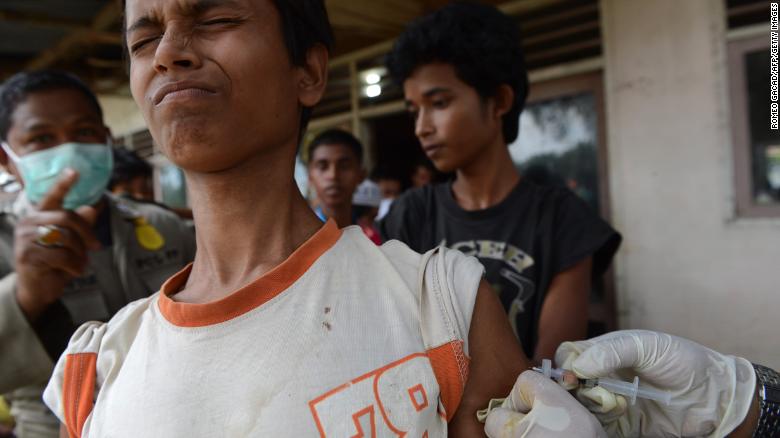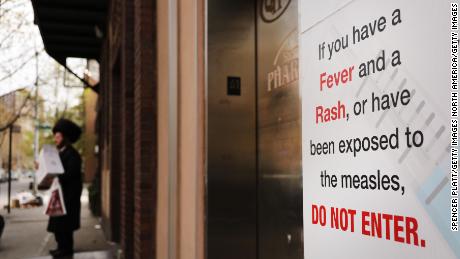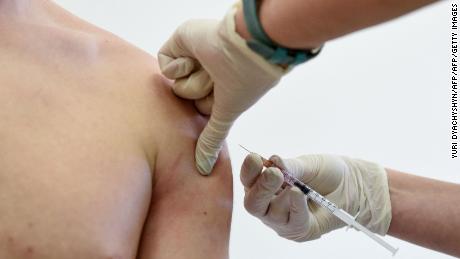(CNN)Measles outbreaks will continue to spread in Europe without a robust response, the World Health Organization (WHO) warned as it urged countries in the region to vaccinate vulnerable populations.
There were 34,300 cases recorded in the region in the first two months of 2019, according to a WHO update -- triple the 11,436 cases in same period last year. A total of 13 measles-related deaths were reported in Albania, Romania and Ukraine.
"If outbreak response is not timely and comprehensive, the virus will find its way into more pockets of vulnerable individuals and potentially spread to additional countries within and beyond the region," reads the statement.
There is no specific treatment for measles, which can cause death, deafness and brain damage, but two doses of a vaccine makes people immune.
The highly contagious viral disease has made something of a comeback across the globe -- in high-income countries in the Americas and Europe as well as in low and middle-income countries in Asia and Africa -- fueled in part by fear of and lack of access to vaccines, and complacency.
Ukraine is experiencing the worst outbreak in Europe, with more than 25,000 cases recorded in the first two months of 2019.
The figures are based on data received up to 28 March 2019, and could be subject to change if other cases exist that hadn't been reported by that date.
Measles cases have been increasing in Europe in recent years, reaching 83,540 in 2018, with 74 related deaths. This compares to 25,869 cases and 42 deaths in 2017, and 5,273 cases and 13 deaths in 2016.
The WHO cites a number of factors in the increasing numbers of cases, including a decline or stagnation in immunization coverage, low coverage at local and regional levels or among marginalized groups, and immunity gaps among older people.
This is despite the region recording 90% coverage for the second measles vaccination in 2017, the highest estimated rate ever.
The organization recommends 95% immunization coverage to achieve so-called herd immunity.
"Every opportunity should be used to vaccinate susceptible children, adolescents and adults," said the WHO in a statement.
"Measles-containing vaccines should also be recommended for susceptible persons intending to travel to countries where measles is endemic and where outbreaks are ongoing."
The resurgence in cases of measles has led to a backlash against those who refuse to vaccinate their children.
In early May the UK's health secretary, Matt Hancock, said anti-vax campaigners were "morally reprehensible, deeply irresponsible" and had "blood on their hands." Making vaccinations compulsory was a possibility, he added.
His comments came days after a study by Unicef, the United Nations' children's agency, found that measles deaths were up globally by 22% in 2017, and complacency and fear of vaccines were among the factors leading to less vaccinations.
And German parents who fail to vaccinate their children against measles could face fines of up to €2,500 ($2,800), as part of draft legislation from the country's health minister.
"Anyone going to a kindergarten or school should be vaccinated against measles," Health Minister Jens Spahn told German newspaper Bild am Sonntag, adding that parents would need to show proof of vaccination or could face fines and exclusion from daycare.
Get CNN Health's weekly newsletter
Sign up here to get The Results Are In with Dr. Sanjay Gupta every Tuesday from the CNN Health team.
Across the United States, 764 cases of measles have been reported since January 1, according to the latest numbers shared by the CDC.
In the US, New York City has said that those who live in neighborhoods where an outbreak began in October, and who had not received their vaccination or did not have evidence of immunity, could be fined $1,000. Since the beginning of that outbreak, 716 cases of measles have been reported in the state.
The New York outbreaks, in ultra-Orthodox Jewish communities, are the longest and largest since measles was declared eliminated in the United States in 2000.








